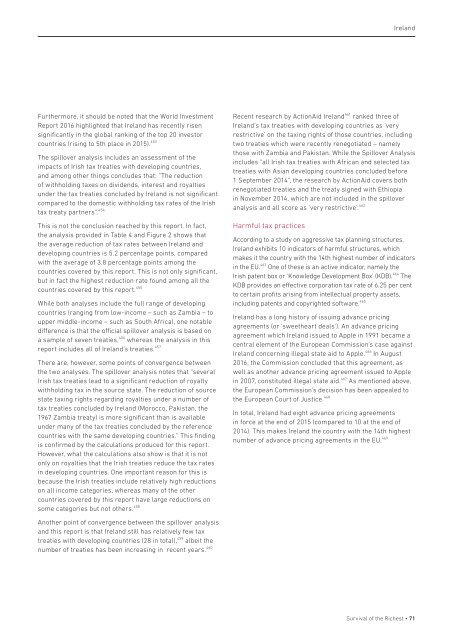You also want an ePaper? Increase the reach of your titles
YUMPU automatically turns print PDFs into web optimized ePapers that Google loves.
Ireland<br />
Fur<strong>the</strong>rmore, it should be noted that <strong>the</strong> World Investment<br />
Report 2016 highlighted that Ireland has recently risen<br />
significantly in <strong>the</strong> global ranking <strong>of</strong> <strong>the</strong> top 20 investor<br />
countries (rising to 5th place in 2015). 453<br />
The spillover analysis includes an assessment <strong>of</strong> <strong>the</strong><br />
impacts <strong>of</strong> Irish tax treaties with developing countries,<br />
and among o<strong>the</strong>r things concludes that: “The reduction<br />
<strong>of</strong> withholding taxes on dividends, interest and royalties<br />
under <strong>the</strong> tax treaties concluded by Ireland is not significant<br />
compared to <strong>the</strong> domestic withholding tax rates <strong>of</strong> <strong>the</strong> Irish<br />
tax treaty partners”. 454<br />
This is not <strong>the</strong> conclusion reached by this report. In fact,<br />
<strong>the</strong> analysis provided in Table 4 and Figure 2 shows that<br />
<strong>the</strong> average reduction <strong>of</strong> tax rates between Ireland and<br />
developing countries is 5.2 percentage points, compared<br />
with <strong>the</strong> average <strong>of</strong> 3.8 percentage points among <strong>the</strong><br />
countries covered by this report. This is not only significant,<br />
but in fact <strong>the</strong> highest reduction rate found among all <strong>the</strong><br />
countries covered by this report. 455<br />
While both analyses include <strong>the</strong> full range <strong>of</strong> developing<br />
countries (ranging from low-income – such as Zambia – to<br />
upper middle-income – such as South Africa), one notable<br />
difference is that <strong>the</strong> <strong>of</strong>ficial spillover analysis is based on<br />
a sample <strong>of</strong> seven treaties, 456 whereas <strong>the</strong> analysis in this<br />
report includes all <strong>of</strong> Ireland’s treaties. 457<br />
There are, however, some points <strong>of</strong> convergence between<br />
<strong>the</strong> two analyses. The spillover analysis notes that “several<br />
Irish tax treaties lead to a significant reduction <strong>of</strong> royalty<br />
withholding tax in <strong>the</strong> source state. The reduction <strong>of</strong> source<br />
state taxing rights regarding royalties under a number <strong>of</strong><br />
tax treaties concluded by Ireland (Morocco, Pakistan, <strong>the</strong><br />
1967 Zambia treaty) is more significant than is available<br />
under many <strong>of</strong> <strong>the</strong> tax treaties concluded by <strong>the</strong> reference<br />
countries with <strong>the</strong> same developing countries.” This finding<br />
is confirmed by <strong>the</strong> calculations produced for this report.<br />
However, what <strong>the</strong> calculations also show is that it is not<br />
only on royalties that <strong>the</strong> Irish treaties reduce <strong>the</strong> tax rates<br />
in developing countries. One important reason for this is<br />
because <strong>the</strong> Irish treaties include relatively high reductions<br />
on all income categories, whereas many <strong>of</strong> <strong>the</strong> o<strong>the</strong>r<br />
countries covered by this report have large reductions on<br />
some categories but not o<strong>the</strong>rs. 458<br />
Recent research by ActionAid Ireland 461 ranked three <strong>of</strong><br />
Ireland’s tax treaties with developing countries as ‘very<br />
restrictive’ on <strong>the</strong> taxing rights <strong>of</strong> those countries, including<br />
two treaties which were recently renegotiated – namely<br />
those with Zambia and Pakistan. While <strong>the</strong> Spillover Analysis<br />
includes “all Irish tax treaties with African and selected tax<br />
treaties with Asian developing countries concluded before<br />
1 September 2014”, <strong>the</strong> research by ActionAid covers both<br />
renegotiated treaties and <strong>the</strong> treaty signed with Ethiopia<br />
in November 2014, which are not included in <strong>the</strong> spillover<br />
analysis and all score as ‘very restrictive’. 462<br />
Harmful tax practices<br />
According to a study on aggressive tax planning structures,<br />
Ireland exhibits 10 indicators <strong>of</strong> harmful structures, which<br />
makes it <strong>the</strong> country with <strong>the</strong> 14th highest number <strong>of</strong> indicators<br />
in <strong>the</strong> EU. 463 One <strong>of</strong> <strong>the</strong>se is an active indicator, namely <strong>the</strong><br />
Irish patent box or ‘Knowledge Development Box’ (KDB). 464 The<br />
KDB provides an effective corporation tax rate <strong>of</strong> 6.25 per cent<br />
to certain pr<strong>of</strong>its arising from intellectual property assets,<br />
including patents and copyrighted s<strong>of</strong>tware. 465<br />
Ireland has a long history <strong>of</strong> issuing advance pricing<br />
agreements (or ‘swee<strong>the</strong>art deals’). An advance pricing<br />
agreement which Ireland issued to Apple in 1991 became a<br />
central element <strong>of</strong> <strong>the</strong> European Commission’s case against<br />
Ireland concerning illegal state aid to Apple. 466 In August<br />
2016, <strong>the</strong> Commission concluded that this agreement, as<br />
well as ano<strong>the</strong>r advance pricing agreement issued to Apple<br />
in 2007, constituted illegal state aid. 467 As mentioned above,<br />
<strong>the</strong> European Commission’s decision has been appealed to<br />
<strong>the</strong> European Court <strong>of</strong> Justice. 468<br />
In total, Ireland had eight advance pricing agreements<br />
in force at <strong>the</strong> end <strong>of</strong> 2015 (compared to 10 at <strong>the</strong> end <strong>of</strong><br />
2014). This makes Ireland <strong>the</strong> country with <strong>the</strong> 14th highest<br />
number <strong>of</strong> advance pricing agreements in <strong>the</strong> EU. 469<br />
Ano<strong>the</strong>r point <strong>of</strong> convergence between <strong>the</strong> spillover analysis<br />
and this report is that Ireland still has relatively few tax<br />
treaties with developing countries (28 in total), 459 albeit <strong>the</strong><br />
number <strong>of</strong> treaties has been increasing in recent years. 460<br />
<strong>Survival</strong> <strong>of</strong> <strong>the</strong> <strong>Richest</strong> • 71


